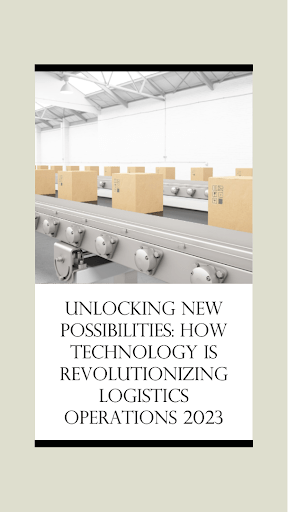Logistics companies must adopt state-of-the-art technology to successfully navigate the intricate network of global supply chains while simultaneously reducing operational expenses. Incorporating advanced tech systems into logistic operations enhances transparency and boosts overall productivity.
Technology has been playing a game-changing role in logistics operations in recent years. It has opened up new avenues and completely altered how items are moved, stored, and delivered. With that said, technology is revolutionizing 2023 logistics operations in the following ways;
-
Freight Solutions
Freight solutions that satisfy various transportation requirements are revolutionizing the logistics industry. That is more imperative as services like LTL (Less Than Truckload), Volume LTL, and Full Truck Load become more widely available in the logistics industry.
Companies may split the transportation expenses and use available space better by using LTL for shipments that are too small to fill a whole vehicle. Shipments longer than 12 feet can benefit from Volume LTL’s cost-effectiveness and efficiency. Full truckloads are ideal for large shipments since they provide companies with their own truck and driver.
To streamline logistics operations you need a reliable freight solution provider that offers superior service at competitive pricing. Hence, find a dependable partner for all your logistics needs . Pick a partner that provides warehousing services to keep your transactions secure.
-
Artificial Intelligence (AI) and Machine Learning (ML)
Many factors in the logistics business can benefit from the application of artificial intelligence (AI) and machine learning (ML) technologies. Inventory management, fleet planning, route optimization, and prediction are just some of their many applications.
Artificial intelligence (AI)-enabled chatbots and virtual assistants have boosted customer service by instantly responding to inquiries faster and delivering relevant information. It’s now projected that Artificial intelligence and machine learning, backed by smart money, will improve existing and future warehousing fulfillment services by increasing productivity, lowering expenses, and making customers happy.
-
Automation and Robotics
Robotics, autonomous cars, and drones are just some of the automation technologies that have had a massive effect on the logistics sector. More picking, sorting, and packaging are being done by robots in automated warehouses and fulfillment centers. Autonomous vehicles and unmanned aerial vehicles are also revolutionizing last-mile deliveries.
-
Blockchain Technology
Increased supply chain transparency, security, and efficiency are just some of how blockchain technology is reshaping the logistics business. Blockchain’s distributed and unchangeable ledger provides real-time tracking and verification of items. That allows for full product transparency and the elimination of counterfeits at every stage of the supply chain.
When it comes to keeping sensitive information safe, blockchain technology is second to none. Its decentralized and tamper-proof nature ensures data integrity and security within the logistics industry. Blockchain also eliminates paper and speeds up verification procedures by digitizing and storing papers.
Financing the supply chain is improved by blockchain because of the increased transparency and the reduced time it takes to obtain funds. Furthermore, it permits traceability and product authenticity, which is particularly important in the food and pharmaceutical industries. The immutable ledger provided by blockchain technology streamlines conflict resolution procedures.
-
Augmented Reality (AR) and Virtual Reality (VR)
The use of AR and VR in the logistics industry is producing revolutionary productivity results. VR allows immersive training and simulation experiences, boosting safety and skill development. On the other hand, AR glasses give warehouse employees real-time information, increasing efficiency and decreasing mistakes.
Last-mile deliveries can also benefit from AR and VR ability to superimpose navigational and customer-facing digital information. Technology like this makes it easier to build remote teams, boosting productivity and eliminating the need for professionals to travel.
With AR and VR, logistics managers can better visualize and plan warehouse layouts and space utilization. The virtual product demonstrations and virtual meetings for cooperation also enhance consumer involvement.
-
Cloud Computing and Software-as-a-Service (SaaS)
Cloud computing and Software as a Service (SaaS) are useful for logistics operations because they provide a scalable infrastructure and inexpensive software solutions.
Regarding specific entities, cloud computing eliminates the need for costly and complex on-premises infrastructure. That is possible because it allows storage and access of remote server data, apps, and resources.
On the other hand, SaaS provides on-demand access to a collection of apps in the cloud for a monthly fee, thereby doing away with the need for costly software installation and upkeep.
Companies can leverage transportation management, warehouse management, and supply chain visibility SaaS solutions to enhance their operations in the logistics industry. These solutions offer real-time tracking, automated workflows, and insightful data. They also streamline warehouse processes and offer excellent visibility into their supply chain.
-
Predictive Analytics and Predictive Maintenance
In an unpredictable market full of unprecedented events, logistic companies must lay out strategies that help foresee potential developments and threats. Using predictive analytics and predictive maintenance substantiates data-driven decision-making and preventative maintenance techniques.
To foresee when repairs or replacements will be required, predictive maintenance uses data analytics and machine learning algorithms. Performance indicators and maintenance records reduce the likelihood of malfunctions and downtime. The use of equipment is maximized, expenditures are cut, and equipment dependability and longevity are enhanced thanks to predictive maintenance.
-
Big Data Analytics
Big Data Analytics is a crucial component when it comes to maximizing fleet operations in terms of efficiency, cost-effectiveness, and regulatory compliance. Fleet operators may increase overall performance by making informed judgments using massive statistics provided by vehicles, drivers, and sensors.
Data gathering is the first step in Big Data Analytics’ workflow for fleet operations. The data is then processed and analyzed with cutting-edge methods, yielding actionable insights that guide smart decision-making. With this information, fleet managers may better arrange maintenance schedules, control fuel costs, and maximize route efficiency.
Fleet operations may be continuously enhanced through monitoring and analysis, allowing managers to spot patterns, assess their effectiveness, and modify them as needed.
Conclusion
In 2023, logistics operations are undergoing a transformative revolution through the adoption of advanced technologies such as AI, ML, Automation, Blockchain, AR/VR, Cloud Computing, and Predictive Analytics. These technologies optimize processes, enhance customer service, improve efficiency, ensure transparency, and enable proactive decision-making. Ultimately, they pave the way for a more efficient and customer-centric logistics ecosystem.







